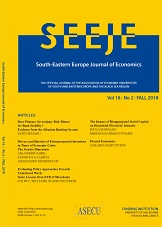Does primary sovereignty risk matter for bank stability? Evidence from the albanian banking system
Keywords:
Bank fragility, primary sovereignty risk, panel data, dynamic GMM, C26, E32, E43, G21, H63Abstract
The paper studies the pass-through effect of primary sovereignty risk on bank stability. For this reason, we followed a new approach using on-site bank balance sheet information to construct our proxy, which represents each bank stability condition and uses a variety of internal and external factors to estimate a balance panel two-step General Method of Moments (GMM) approach for the period 2008 Q03 – 2015 Q03. The main findings provide strong empirical evidence supporting the view that primary sovereignty risk negatively affects bank stability. However, the pass-through effect of primary sovereignty risk is found to be relatively low. Rather improving macroeconomic and financial market conditions are found to be important components through which banks become more immune. The rest of the results imply that other bank-specific indicators, namely the extent of intermediation, off-balance sheet active, excessive capital, credit risk and profitability do not have a significant effect.

